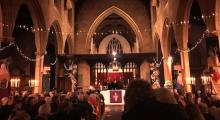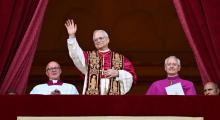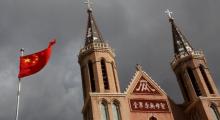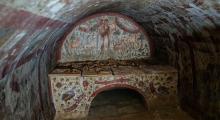Issued by the Catholic Center for Studies and Media - Jordan. Editor-in-chief Fr. Rif'at Bader - موقع أبونا abouna.org
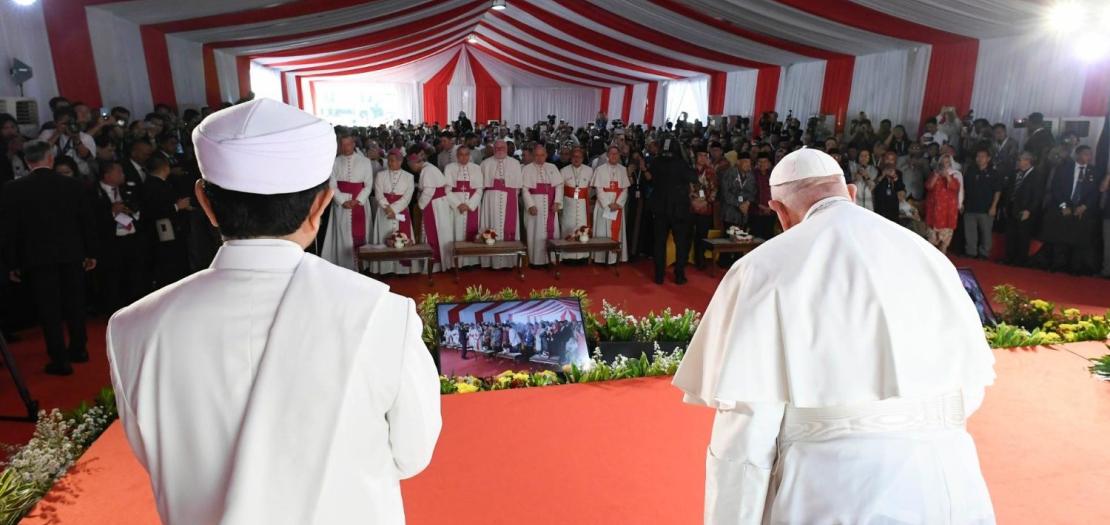
‘Different and complementary’. The Declaration of Istiqlal is ‘a strengthening’ of the document on fraternity signed in Abu Dhabi, because it considers ‘two fundamental issues: violence of conflicts and abuse of creation’. This is what Monsignor Paolo Martinelli, Apostolic Vicar of Southern Arabia (United Arab Emirates, Oman and Yemen), stresses to AsiaNews, commenting on Pope Francis' trip to Asia and Oceania. The prelate, reached by phone in Abu Dhabi where he recently returned after meeting the pontiff at the Vatican together with the bishops of the Latin Bishops' Conference in the Arab Regions (CELRA), supports his continuous call “for the defence of human beings and life”.
Dehumanisation, abuse of creation, inter-religious dialogue, tunnels that connect - and unite - under the banner of friendship, care for ties and creation: these are many of the topics touched on in these first days in Indonesia by Pope Francis, the first stop of the apostolic journey between Asia and Oceania scheduled from 2 to 1 September. For the Vicar of Arabia today there is ‘the danger of becoming accustomed to the dehumanisation caused by conflicts and wars’. For this reason, after the signing with the Imam of al-Azhar Ahmed al-Tayeb, the ‘Joint Declaration of Istiqlal’ signed yesterday with Grand Imam Nasaruddin Umaris equally significant. ‘Having strong symbols like the “Tunnel of Friendship” or the “Abrahmic Family House” is really important,’ he says, ‘as they represent vital points where we can experience that we can walk together, valuing differences.
Following is the text of the interview with Msgr. Martinelli:
Your Excellency, how important is the pope's reminder of the theme of dehumanisation in a world where scenarios of war and violence are multiplying?
I think Pope Francis does very well to continually call for the defence of the human being and of life. Indeed, today there is a danger of becoming accustomed to the dehumanisation caused by conflicts and wars. The pontiff's interventions constitute a barrier, a critical resistance to the culture of indifference and hatred that is spreading. His words prevent us from anaesthetising ourselves before the horror of evil and help us rediscover that we are made for human brotherhood and the pursuit of the common good.
Then there is also the issue of creation, the ‘common home’ repeatedly stressed by Francis: after Dubai and in the perspective of the Cop29, what has changed in the sensitivity of religions on this matter?
The December meeting in Dubai, COP28, was very important in several respects. I remember that there was also a pavilion run by the different religions, which promoted significant meetings with exponents of different spiritual traditions. Above all, it was the first time that a meeting of this type and at this level officially considered the importance of the contribution of religions to the issue of protecting the environment and creation. The discourse and commitment continue, albeit in different ways. Here I see that the topic remains alive in the debate. For our part, I can say that there are ecumenical initiatives that continue to focus on the issue of the common home, especially in this ‘time of creation’. Moreover, it is part of our catechism programme to help children understand the deep connection between the experience of the Christian faith and the protection of creation. We must focus on education, for a real change of mentality on decisive issues.
Yesterday, the pope referred several times to the theme of the tunnel, a metaphor and a concrete element such as the ‘Friendship’ tunnel that connects the church and the mosque in Jakarta, which ‘connects’ to the Abrahamic House in Abu Dhabi: how important are these symbols, which become a physical place?
Symbols are really important because they speak not only to the head but also to the heart and body, to the whole person, they are the communication of the integral human. Having strong symbols like the ‘Tunnel of Friendship’ or the ‘Abrahmic Family House’ is really important today because they represent vital points where we can experience that we can walk together, valuing our differences, without having to overcome them. We need places where we can experience that walking together between people of different faiths is not just an idea or principle, but a real possibility.
Furthermore, I am very impressed by the speech Francis made yesterday on inter-religious dialogue. And I would like to emphasise two aspects: first of all, that dialogue between people of different faiths is not aimed at finding only and primarily what we have in common, but at appreciating differences, mutual respect, really getting to know each other by overcoming prejudices. One knows oneself better when one welcomes the difference of the other. The pope calls this ‘caring for bonds’. One can only create bonds if one recognises the good of the other, as the other.
Again, I am struck by what the pontiff says about what lies ‘underneath’ all religions, the invitation to look in depth: he says that ‘the root common to all religious sensitivities is one: the search for an encounter with the divine, the thirst for the infinite that the Most High has placed in our hearts, the search for a greater joy and a life stronger than any death, which animates the journey of our life and impels us to come out of our ego to go towards God’. In this perspective, interreligious dialogue is a call to every man and woman to return to the question of God as a fundamental human question. The human person is a desire for God, for fulfilment, for the ultimate meaning of the things we experience. This religious dimension represents the heart of every person. When man forgets it, he dehumanises himself. The first task of religions is to put the question of God back on this level.
Is the signing of the ‘Istiqlal Declaration’ a step further than the Abu Dhabi document with the Imam of Al-Azhar?
These are two different and complementary things. The Istiqlal Declaration seems to me a strengthening of the document signed in Abu Dhabi. The document on Human Fraternity has a broader articulation, it touches on many topics, it indicates methods and objectives that engage believers of different religions, especially Christians and Muslims. Here, however, it is a text that considers two fundamental issues: the violence of conflict and the abuse of creation. It insists on how different religious traditions, interreligious dialogue, must contribute to stopping conflicts and caring for the common home. The document significantly refers to the ‘Pancasila’, which represents the philosophical tradition on which Indonesia bases the peaceful coexistence of different peoples and cultures. It is significant that the document expresses a very specific cultural aspect.
How does the Gulf look at this apostolic journey to the Far East and what value does the pope's reminder have (also) for the Muslim world, where there is no lack of tension around the issue of proselytism?
The pontiff's journey is extremely important and interesting also for the reality of the Gulf. The Pope makes it very clear that proclaiming the Gospel has nothing to do with proselytism. Living in Islamic countries leads one to rediscover that the heart of evangelization is witness, concretely realizing the relationship between faith and life. True witness is never anonymous. In witnessing, we communicate what we hold most dear - Christ and his Gospel - freely opening ourselves to the relationship with the other, with full respect for the other's freedom. Interreligious dialogue is one of the fundamental relationships of Christian witness.


